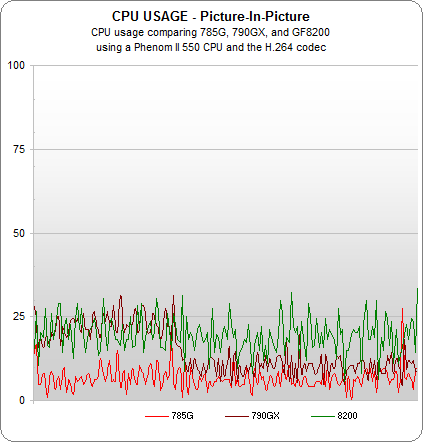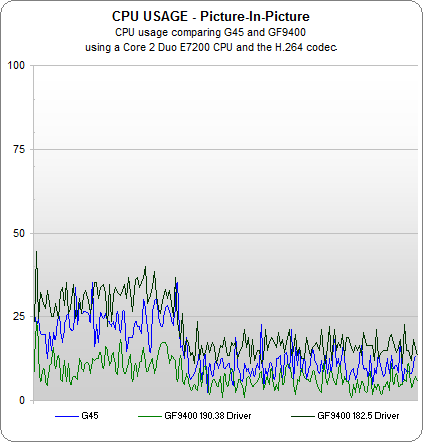Blu-ray Done Right: How Does Your Integrated GPU Stack Up?
CPU-Usage Benchmarks: Picture-In-Picture Acceleration
In this interesting benchmark, we're going to see what happens when these IGPs are tasked to decode a picture-in-picture Blu-ray disc. To help us see what's happening, we've chosen to benchmark a part of the Blu-ray "Sunshine," where the second video stream is dropped after a minute or so, but the CPU usage results are recorded for another couple of minutes. This lets us see a tangible difference of CPU usage between one and two streams of video:
The benchmark is a little muddled, so pay close attention. It looks like the GeForce 8200 (green line) is running somewhat flat at the top of the results. The 785G (light red line) is running flat at a lower CPU utilization and the 790GX (dark red line) starts off at a higher CPU utilization but drops about a third of the way in.
What's happening here is that both the GeForce 8200 and Radeon 785G possess dual-stream acceleration and aren't fazed much by the transition between two-to-one video streams. However, the 790GX does not have dual-stream acceleration, so it has to use more CPU resources at the beginning of the video.
Oddly enough, regardless of the 790GX's lack of dual-stream acceleration capabilities, it still pulls similar CPU utilization compared to the GeForce 8200 when processing multiple streams. When it drops down to a single stream of video, the 790GX lowers CPU resources and approaches 785G levels.
The Intel systems show a clearer story, with the GeForce and the new 190.38 driver demonstrating good dual-stream acceleration, but keep in mind that the 190.38 driver does not offer all of the visual-quality enhancements that the old 182.5 driver does. The 182.5 driver doesn't appear to have picture-in-picture acceleration and neither does the Intel G45, although the G45 is performing a bit better.
Once again, however, the CPU usage by any of these solutions is somewhat insignificant. Even lower-budget CPUs should be able to easily handle what Blu-ray throws at them. As time goes on and as CPUs become even more powerful, benchmarks like this will inevitably offer less and less useful information.
Get Tom's Hardware's best news and in-depth reviews, straight to your inbox.
Current page: CPU-Usage Benchmarks: Picture-In-Picture Acceleration
Prev Page CPU-Usage Benchmarks: VC-1 Codec Next Page Power-Usage BenchmarksDon Woligroski was a former senior hardware editor for Tom's Hardware. He has covered a wide range of PC hardware topics, including CPUs, GPUs, system building, and emerging technologies.
-
Proximon Great article. I think maybe the 4650 is a bit overkill, but that's just nitpicking.Reply
As long as you are talking about HTPC builds though, you might want to mention temps... aren't the 9300/9400 boards very hot? -
epsiloneri Power draw is not interesting because of the electricity bill, it is the generated heat needed to be dissipated with the associated noise levels due to cooling that is critical for an HTPC.Reply
-
HalfHuman i don't get it why a home theater would use a 1200w power source. at the same time i don't get why would someone evaluate the power efficency using this kind of power sorce. if you ask me i'd make this crazy ass power supplies illegal. a normal hometheater should not use more than 50w at idle and 100-150w at load. seems that this is what these actually consume. factor in the less than 5% load on the power supply and you get a masterfull 50-60% power efficency. i'd love to see some proper power supply test.Reply -
falchard BTW, I would like to see a "Can it play Crysis" article in the future that runs down every video card and IGP, then determines if it can possibly play Crysis and at what settings.Reply -
HalfHuman the 1200w power supply is green as in blue-green mould green.Reply
this is in fact an excellent power supply... if you use it. at 100watts load it has a "cool" 76% efficency. if the intel pc uses less than 82watts in load and 66watts in idle you can only imagine the efficency a power supply has at below 5% load. the site suggest around 65% so instead of having a proper power supply using 40watts or less when idle, you get this "green" efficient hummer who swollows 66w. i really like you articles guys but this kind of testing is not the way to go. -
Efficiency isn't even tested below 20% load i believe But it should still be around 70-80% it is a Thermaltake Toughpower 1200w and all of them(3 listed on their site) are standard 80% eff rated or bronze. Ture a more modest Delta,Seasonic 250w or 300w would be much more appropriate for a htpc.Reply
-
HalfHuman 20% for this would be 240watts and efficency would still be reasonable.Reply
i posted some link but i see it's been removed. that review said something about 65% minimum. -
drew_a Uh, guys... you might want to edit this article...Reply
"For the last CPU utilization test, we will check the capability of these graphic chipsets to accelerate picture-in-picture (PIP) video streams. To do this, we will use the Blu-ray dick Sunshine, which utilizes the H.264 codec and features PIP commentary during playback."
on page 6 -
icepick314 "If you are an audiophile, you should know that out of these remaining options, only the GeForce 9300/9400 can handle uncompressed eight-channel LPCM audio over HDMI 1.3."Reply
i did NOT know this...
i thought only way to listen to uncompressed audio on blu-ray was using Asus Xonar HDAV 1.3 audio card to bitstream to your receiver...
it's nice to know that IGP has enough power to handle 1080p while streaming HD audio codec....

